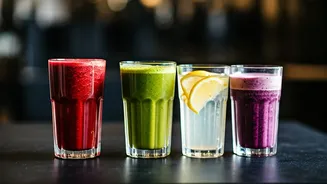Pomegranate Juice
Pomegranate juice is more than just a refreshing beverage; it's a powerhouse of antioxidants. These antioxidants combat oxidative stress, a major contributor
to artery plaque formation. The juice's ability to reduce inflammation also plays a crucial role in preventing plaque buildup. Regular consumption can improve the overall health of blood vessels, reducing the risk of cardiovascular diseases. Pomegranate juice is known to enhance the production of nitric oxide, which helps to relax and widen blood vessels, promoting better blood flow. Incorporating this vibrant drink into your diet is a simple step towards a healthier heart. Consider adding it to your breakfast or as a midday refreshment. Remember to choose fresh, pure pomegranate juice without added sugars for the best results. The natural sweetness and health benefits make it an excellent choice for anyone looking to support their cardiovascular well-being. Always consult with a healthcare professional to determine the best approach for your health needs.
Beetroot Juice
Beetroot juice is another excellent choice for those looking to support their cardiovascular health. Rich in nitrates, beetroot juice converts to nitric oxide in the body, promoting vasodilation – the widening of blood vessels. This effect leads to improved blood flow and reduced blood pressure, both of which are critical factors in preventing artery plaque. Beetroot also possesses anti-inflammatory properties that contribute to the overall health of the cardiovascular system. Regular consumption of beetroot juice can improve exercise performance and endurance by optimizing blood flow to muscles. Furthermore, the antioxidants in beetroot help protect blood vessels from damage. This is a flavorful and effective way to fortify your arteries and blood flow. Experiment with beetroot juice by combining it with other ingredients to make it more palatable, but be sure to consume it in moderation. Its earthy flavor can be easily balanced with fruits like apples or berries. Always speak with your doctor to make sure it's the right choice for you.
Green Tea
Green tea is renowned for its numerous health benefits, and its impact on cardiovascular health is undeniable. Packed with catechins, particularly epigallocatechin gallate (EGCG), green tea boasts potent antioxidant properties. These compounds help combat oxidative stress and prevent the formation of artery plaque. The regular consumption of green tea can also reduce cholesterol levels and improve the function of the endothelium – the lining of blood vessels. Studies have shown that drinking green tea can lower the risk of heart disease and stroke. Enjoying a cup of green tea daily can be an easy and enjoyable way to support your heart health. Green tea provides a refreshing and calming experience. Consider brewing green tea in the morning or as a relaxing afternoon beverage. Its mild flavor and versatility allow it to be enjoyed hot or cold, making it a convenient addition to any diet. Ensure to choose quality green tea to fully reap the benefits.
Turmeric Milk
Turmeric milk, often called golden milk, is a traditional beverage gaining popularity for its anti-inflammatory properties and its potential cardiovascular benefits. The active compound in turmeric, curcumin, is a powerful antioxidant that helps prevent the damage that leads to artery plaque. Consuming turmeric milk regularly can help reduce inflammation throughout the body, providing protection to blood vessels. Curcumin can improve the function of the endothelium and may lower cholesterol levels, contributing to overall heart health. Turmeric milk also has a calming effect, and it can be a soothing addition to your evening routine. Prepare your turmeric milk by mixing turmeric powder with warm milk and a pinch of black pepper, which helps improve curcumin absorption. You can also add other spices like cinnamon and ginger for added flavor and health benefits. Always consult your doctor before making any major changes to your diet, and adjust the ingredients according to your personal preferences and needs.













